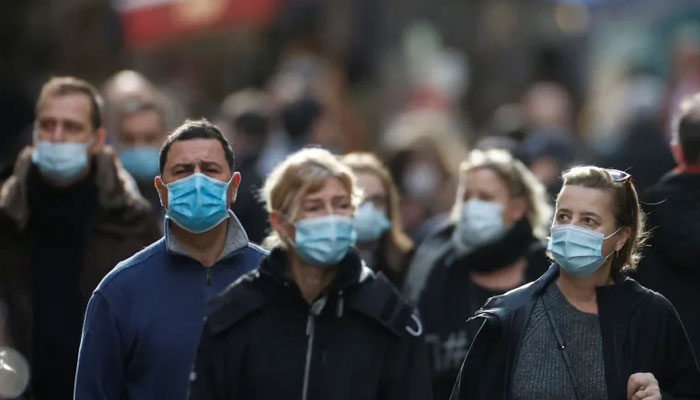Goal to end extreme poverty by 2030 ‘out of reach’: World Bank
WASHINGTON: A global target of ending extreme poverty by 2030 is “out of reach,” said the World Bank on Tuesday, adding it could take three decades or more to do so.
“Global poverty reduction has slowed to a near standstill, with 2020-30 set to be a lost decade,” according to a new report assessing progress on eliminating poverty after the Covid-19 pandemic.
The world is experiencing serious setbacks after decades of progress, noted World Bank senior managing director Axel van Trotsenburg.
This comes amid overlapping challenges including slow economic growth, the Covid-19 pandemic, as well as climate shocks.
He warned that with these crises, “a business-as-usual approach will no longer work.”
Almost 700 million people, or 8.5 percent of the global population, live on less than $2.15 daily -- the threshold for extreme poverty.
This is set to remain at 7.3 percent in 2030.
Today, extreme poverty remains concentrated in countries with low growth and fragility, many in Sub-Saharan Africa, the World Bank said.
And 44 percent of the world´s population lives on below $6.85 a day, which is the poverty line for upper-middle-income countries.
“The number of people living under this poverty line has barely changed since 1990 due to population growth,” the bank noted.
It added that “future poverty reduction requires economic growth that is less carbon emissions-intensive than in the past.”
Nearly one in five people are expected to be hit by a severe weather shock in their lifetime, and will struggle to bounce back from it, according to the World Bank.The report said there had also been little progress on another development goal – to reduce inequality. While the number of countries with especially large gaps between rich and poor had declined from 66 to 49 over the past decade, the percentage of people living in countries with high levels of inequality had remained unchanged at 22 percent. These countries were concentrated in Latin America, the Caribbean and sub-Saharan Africa.
Max Lawson, the head of inequality policy at Oxfam, said: “With the richest 1 percent capturing more wealth than the bottom 95 percent, it is little wonder that it will take a century to end poverty. Rapidly and radically reducing inequality in every country should be the absolute top priority of the World Bank.
“We agree with the World Bank that ordinary people across the world are facing a lost decade, which will scar a whole generation, but at the same time the richest are looking at their best decade ever and these two things are closely linked.”
-
 Jake Humphrey Shares The Powerful Meaning Behind His Wrist Tattoo
Jake Humphrey Shares The Powerful Meaning Behind His Wrist Tattoo -
 Matthew Lillard Weighs In On His Return To The 'Scream' Franchise After Decades Of Persistence
Matthew Lillard Weighs In On His Return To The 'Scream' Franchise After Decades Of Persistence -
 Travis, Jason Kelce Share Blunt Dating Advice For Men: 'She's Gonna Hate You'
Travis, Jason Kelce Share Blunt Dating Advice For Men: 'She's Gonna Hate You' -
 Australia To Launch First High-speed Bullet Train After 50-years Delay
Australia To Launch First High-speed Bullet Train After 50-years Delay -
 Meghan Markle Turns To Desperate Bids & Her Kids Are Her ‘saving Grace’: Here’s What They’ll Do
Meghan Markle Turns To Desperate Bids & Her Kids Are Her ‘saving Grace’: Here’s What They’ll Do -
 King Charles Gives A Nod To Sister Anne's Latest Royal Visit
King Charles Gives A Nod To Sister Anne's Latest Royal Visit -
 Christian Bale Shares Rare Views On Celebrity Culture Urging Fans Not To Meet Him In Person
Christian Bale Shares Rare Views On Celebrity Culture Urging Fans Not To Meet Him In Person -
 Ariana Grande To Skip Actor Awards Despite Major Nomination
Ariana Grande To Skip Actor Awards Despite Major Nomination -
 North Carolina Teen Accused Of Killing Sister, Injuring Brother In Deadly Attack
North Carolina Teen Accused Of Killing Sister, Injuring Brother In Deadly Attack -
 Ryan Gosling Releases Witty 'Project Hail Mary' Ad With Sweet Reference To Eva Mendes
Ryan Gosling Releases Witty 'Project Hail Mary' Ad With Sweet Reference To Eva Mendes -
 Teyana Taylor Reveals What Lured Her Back To Music After Earning Fame In Acting Industry
Teyana Taylor Reveals What Lured Her Back To Music After Earning Fame In Acting Industry -
 Prince William Shows He's Ready To Lead The Monarchy Amid Andrew Scandal
Prince William Shows He's Ready To Lead The Monarchy Amid Andrew Scandal -
 Lux Pascal Gushes Over Role In Tom Ford's 'Cry To Heaven': 'I Just Wanted To Be Part Of This Picture'
Lux Pascal Gushes Over Role In Tom Ford's 'Cry To Heaven': 'I Just Wanted To Be Part Of This Picture' -
 Near-blind Refugee Found Dead In Buffalo After Release By US Border Patrol
Near-blind Refugee Found Dead In Buffalo After Release By US Border Patrol -
 Firm Steps In Forcing Andrew’s Hand: ‘Can No Longer Keep A Promise'
Firm Steps In Forcing Andrew’s Hand: ‘Can No Longer Keep A Promise' -
 Kenyan Man Accused Of Recruiting Men To Fight In Ukraine
Kenyan Man Accused Of Recruiting Men To Fight In Ukraine




